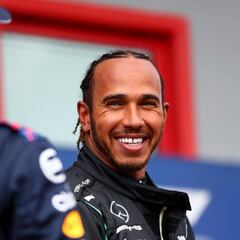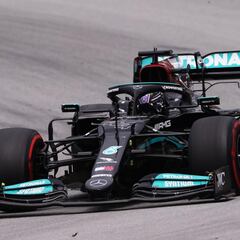Interview with Lewis Hamilton: "Formula 1 has become a billionaire boys club"
F1 legend Hamilton tells AS in an interview ahead of the Monaco GP that an eighth Drivers' Championship is a secondary priority to his fight for diversity.
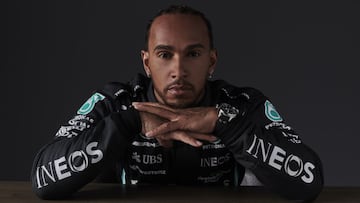
Lewis Hamilton (Stevenage, UK), the greatest Formula 1 driver of all time according to the record books, says that in the last days of his life he won’t remember his victories, but rather what he did to make a difference to peoples’ lives. Right now the sport that made the 36-year-old a legend is only the second of his priorities. His anti-racism campaigning and fight for diversity is as important as everything he’s done on the track. 100 pole positions, 98 victories, seven titles. And gunning for his eighth, which would put him ahead of Michael Schumacher. In a 20-minute conversation with AS in Monaco, with only his team’s PR crew in attendance, Mercedes’ superlative champion expresses his human side first and foremost. He swerves round questions on the Spanish drivers, and doesn’t dwell on his rivalry with Verstappen. His silence can, at times, possibly be taken as an affirmation. Many know Hamilton. This is Lewis.
- In your whole career, since you first drove a go-kart as a boy, during your entire career, have you ever raced with another Black driver on the grid?
I haven’t, no. I haven’t even seen any. My dad, my brother and I we were always the only people of colour. It was just normal for us. But we were always aware of it. It became normal for us, but at the beginning it was very obvious to us that we weren’t always welcome. Even today, it’s the same. When I got to the cars [after the karts] there was one Chinese driver... one or two Asian drivers that we raced, but no Black drivers. I realised [my situation was different] when we first got to the go-kart track, and I was reminded of it every race, from the time I was eight years old. But it’s the same case now, if I stop today, we have one Asian driver, but there are no Black drivers at the moment and none coming through.
- In the NBA and the NFL there are many Black athletes who can support the anti-racism movement, but here in F1 you are on your own. What can you do to help make the sport more diverse?
I think over this past year you’ve seen it’s about having difficult conversations. I think over the last year there’s been a lot of awareness, which was sparked in the States, but the wave came over to Europe. Because the racism is different in Europe, but it’s still very much there. And the last year has been a real learning phase, for people to realise and be aware of what Black people experience in their lives and the challenges [they face]. So, I have this commission, which shows you the challenges and barriers Black people in particular face, that white people perhaps don’t. It’s not about dividing, it’s about bringing people together, it’s about holding people accountable. We have to educate one another more. If you have a friend from a minority, ask the question: what have they experienced, how do they feel, what challenges have they faced… because it will be different. For me, I’m comfortable having conversations with my boss, with Mercedes, with partners. We have to have those uncomfortable conversations. It’s nothing to be embarrassed about. “What can we do together to make it more diverse?” All the businesses need to be more reflective of the world around us. And it’s going to take time, it’s not something we can change overnight. But we all bleed the same blood. We’re all the same. Even if we’re different colours, we’re the same. So we have to make sure that people feel that that’s the case.
- You said at the start of the season that your priority this season is not winning the title, but fighting for diversity. Where does the sporting side of F1 come on your scale of life priorities right now?
- The sporting side for me is my life, it’s my job. But right now I’d say it’s number two. But I wouldn’t be able to do the other things without the racing so it’s a close second, but what’s really in my heart right now is that I want to work with people, I want to educate myself more, but I also want to encourage those around me to get more educated. It’s taking a lot of time, getting on calls with the people running Formula 1, saying to them: “What are we doing? How can we be more efficient in raising awareness? How can we make sure that the future of Formula 1 and motorsport is more diverse?” It’s never taking no for an answer. So on the racing side, I still have to be the best and work at being the best, and that requires just as much time, but that’s enjoyment, that’s fun for me. Racing is what I’ve wanted to do since I was kid. The questions over diversity, that’s a struggle, that’s a real fight… one that’s not going to be easily won.
- What would winning the eighth title mean to you? What would it change?
- It’s not going to change anything. I know who I am and what I’m capable of, where I come from and what we’ve achieved. I have no idea if I’m going to get it, I’m working towards it. But it’s not going to change anything in my life. Numbers are not something that I focus on. What I would be proud of is that last year the team only had 3% diversity, if at the end of this year we have 5% or slightly more, and in the next couple of years we were into the teens, that for me is huge. So that’s what I’m most passionate about, but of course I want to win this championship, because there are a lot of people working in the background - we win and we lose as a team.
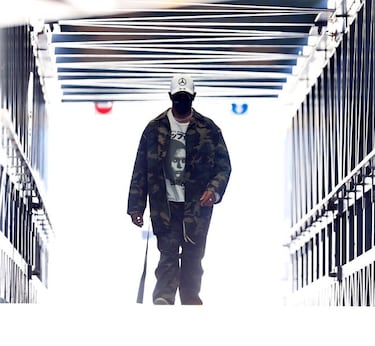
"Formula 1 is my second priority"
Lewis Hamilton
- So it’s not the racing stats you’re interested in, but the diversity stats…
- Yes, definitely. Ultimately, if you try and think about your last days here on earth, what are you going to wish you had accomplished, and for me, it’s helping people. There’s no greater feeling than being able to help somebody, whether it’s encouraging someone to get out there, or keep going for something that they are dreaming… And if you’re able to help more than one, then that’s, wow! You can rest in peace, knowing you did something with your time. That’s where I am. I’ve definitely done a lot, but now all my focus is on what I can do for others. I’m living my dream, I don’t have a need for anything. But how can I help the next kid who wants to be a racing driver or engineer?
- Back on the track in 2021, are you enjoying the battle against Max (Verstappen) and Red Bull?
I love it. This is what I live and breathe for. I’ve been fighting battles since I was eight years old. There’s nothing greater.
- Is Verstappen your natural successor in F1?
- I don’t know. I think there’s a great group of young talent here. Given the opportunity, I think Lando (Norris) for me has a huge amount of potential. And so does Charles (Leclerc). I can’t predict which one of these is going to be out in front leading this sport.
- What do you think about this younger generation of talented drivers in F1? Sainz, Norris, Leclerc…
- I don’t think it really matters what I think. I’m not the person to pass judgement if it’s the best, or if it’s a good generation or not. There are always waves of drivers that come through. There was me and Nico (Rosberg) and Kubica, and Alonso just before that, there was the Schumacher era… there are always going to be eras. For me, personally, we’re living in a time that this is really a billionaire boys club. If I go back to where I started, growing up in a normal working class family, there’s no way that I could be here. No way. All the guys that you’re fighting against just have that much more money. I think for the future we’ve got to work to change that. To make it more accessible, to people from rich and more normal backgrounds.
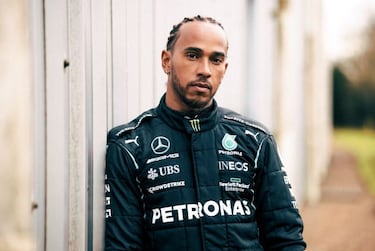
"When I joined this team, it was the underdog"
Lewis Hamilton
- A few days ago Fernando Alonso said you deserve full credit, because you’ve won when Mercedes was incredibly strong, but also when there was another car that was just as good. Do you think the debate over the role Mercedes has played in your triumphs has been put to bed?
- I don’t know, I don’t live my live to look at all the stuff that gets said, so I’m not fully aware of everything. Of course I’m aware that people make those comments. There’s always an excuse for someone who’s succeeding. People will always find a way of trying to talk down someone’s success. So I just don’t really focus on it. I know how hard I have to work to be fit, to continuously stay consistent, not make mistakes, to extract absolutely everything from the opportunity that I’ve been given, and no-one can take that away from me. I hope I have more opportunities over the next few years, with more close battles, so that people can see just what I’m capable of. So I’ll keep fighting and keep racing. And hopefully people will see more of me.
- How much interest do you pay to the rule changes for the future of F1?
- I keep a close eye on it, of course, ‘cos I’m in the sport. You have to understand the technology you’re working with. You have to understand the technical challenges that the team have to go through. You have to understand the complications of the budget cap and the pressure that puts on people and how much harder it is to develop. For example, I just did the tyre test for next year's tyre, the 18-inch wheel. I want to know what the difference is, how that’s going to affect me as a driver and how it’s going to affect how I’m going to steer the next car. The cars are getting heavier and slower and that seems like a step backwards, for me. We should be going faster and more efficient. The cars were better when they were lighter. But the higher powers make those decisions and you live with it and we work as hard as we can to do our best with it.
- Will you keep racing until you’re 41, like Kimi Raikkonen?
- I don’t think so. I don’t think I want to race forever. This will always be the greatest voyage I’ve been on. But there are lots of other things that I want to do; things I’ve not been able to do while I’ve been in competition. When you’re in season. There are other things that I’ll want to do. So that’s five years away still, I don’t think I’ll be racing for five years, but never say never…
- Do you think you’ll regret not having raced for some of the other big teams in F1, in particular Ferrari?
I try not to live with regrets. Of course I’ve made mistakes and you always look back with hindsight and you wish you could have done things differently, but I don’t look down the grid and think, “Oh, I wish that I could have done something there.” I prefer underdogs. When I joined this team, it was the underdog, it was a team that was not winning. I think it was fifth in the constructors championship. And I love that we came from more humble beginnings, in the sense of building to win, as opposed to top teams that have all the records and success, so more success has less meaning.
- Will you still follow F1 when you stop driving?
- I think so, I think I’ll always keep a close eye on it. It’s been my greatest passion and it’s been one of my greatest privileges for me to be a part of this sport. I think probably when I first step away from it one day, I’m most likely not going to watch for a moment at least. Just to take break, but I’m going to want to watch, because I’m a fan of the sport. So I’ll always watch. But I think that the role that I feel that I have in the sport, pushing for diversity, is going to take a lot of time. It’s going to take time to really see drastic change happen, in 10, 15 or 20 years time. That’s going to be working with people like Stefano Domenicali (CEO of Formula 1) to push for that… so I’ll always have a job here I think.
Related stories
- Thanks and good luck.
- Thank you very much.
- Lewis Hamilton
- F1 Drivers Championships
- GP Mónaco
- Monte Carlo circuit
- Mercedes AMG Petronas F1 Team
- Black Lives Matter
- Formula 1
- Race tracks
- F1 Teams
- Violencia racial
- Afroamericanos
- Auto racing
- Racial conflicts
- Afrodescendientes
- World Championship
- Motor sports
- Sports facilities
- Teams
- Social movements
- Black people
- Racism
- Violence
- Competitions
- Hate crimes
- Social groups
- Accidents and crimes
- Crimes
- Social problems
- Society
- Justice
- Prejudices

